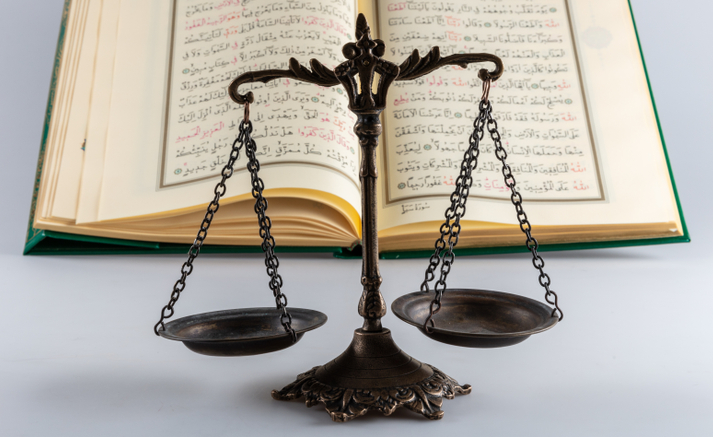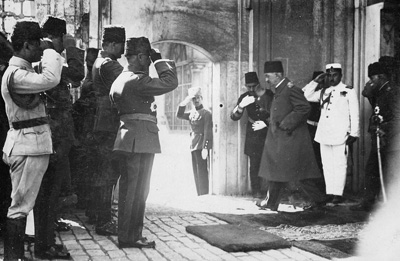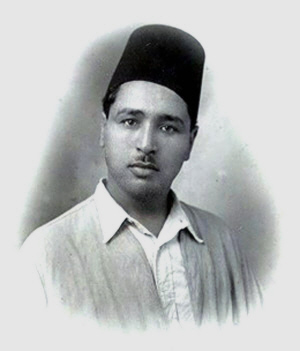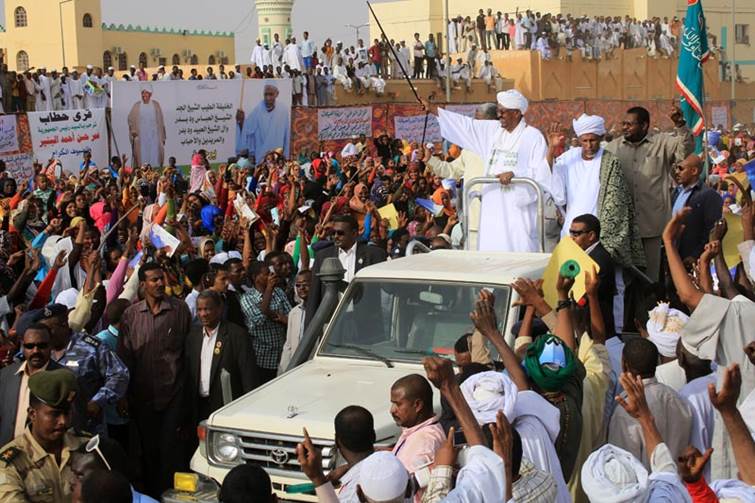
The terms ‘Islamic state’ and ‘Islamic law’ are modern political terms fashioned by ordinary folk and do not have any religious sanctity to them.
The state and the political process are by their nature relative, changing and moving. The same goes for knowledge, skill and human experience. There is therefore no such thing as ‘Islamic law’ in this area – it is just a claim.
BY RASHA AWAD
I AM WELL AWARE that simply the above title is enough for the inquisition courts to unsheathe their swords, and for fatwas declaring me an infidel to be unleashed, or appeals made for me to repent, and sermons to be delivered – some well-meaning, others apparently religious but in reality harbouring some political manoeuvring.
But I chose this title deliberately, because I believe that one of the reasons for the spread of ‘political Islam’, and the most important reason that suggests that the chain of political frauds in the name of religion will only go on, is the approach of appeasement, the avoidance of confronting it critically and radically, and the at times ‘unconscious identification’ by politicians, and liberal, secular intellectuals with those who promote a discourse of political Islam.
To give some instances of this, whenever the astute question is raised, for example, concerning the status of the ‘Islamic State’ and the application of ‘Islamic Sharīʻa’ in Sudan, some go on to say that what Jaafar Nimeiri applied in the 1980s, or what the Inqādh (‘Salvation’) regime applied since their ill-omened revolution, is not the ‘real Sharīʻa’ but a ‘distortion of the Sharīʻa’, or that what the Salvation has done to the state stands in contraction with the duties of the ‘Islamic State’. Others go so far as to pose condemnatory questions (‘Is this an Islamic state?’), as if the Islamic State or Islamic Sharīʻa are naturally assumed givens, and that differences arise only with respect to how these are applied or the suitability of this or that current to lead us towards securing these goals!
This type of talk carries within it the seeds for creating a current of ‘new political Islam’ to address the task applying Islamic law ‘properly’ and removing the ‘distortion’ perpetrated at the hands of Nimeiri and Inqādh! After that they are to establish a ‘true Islamic state’ on the ruins of the present ‘pseudo-Islamic state’! So we are to make our preparations to receive the ‘new fraudsters’ who will open up for us a new page in emotional blackmail under the name of ‘Islamic law’ and the ‘Islamic State’. This page will continue to remain open unless we strip the terms ‘Islamic State’ and ‘Islamic Sharīʻa’ of their false sanctity by means of rational discussions about them, discussions that can subject them to a systematic and conceptual deconstruction and allow them to be decisively overcome. At this point a secular discourse can kick off from an independent platform entirely free of this ‘unconscious involvement’ in the snares of ‘political Islam.’
Political Islam has failed to co-exist peacefully.. secularists have therefore to stop rehearsing the old arguments against political Islam
However, establishing a secular discourse and naturalizing it into the cultural environment will serve to turn the Islamic religion into an important and essential branch in the formation of its conscience and feeling. This will require a painful period of intellectual gestation within the Islamic heritage along with programmes critical of all of the reference points of the contemporary Islamist groups, if it wishes to crystallize a new awareness and new intellectual visions that can accommodate the genuine and sincere questions of millions of Muslims who are not involved in this political fraudulence in the name of Islam. Principal among these is the question of whether it is possible for a devout Muslim to support secularism and the democratisation of the state, or to interact positively with the achievement of the modern mind. For this modern mentality is also a subject of debate.
As for the Muslims implicated in the sin of exploiting Islam in this political fraud, these have to be treated differently than from a standpoint of defensiveness. Whenever they pose their sly questions such as: ‘do you, or do you not, accept the Islamic state and Islamic law?’ My reply, for which I bear personal responsibility, is to say that I totally and unequivocally reject these ideas, for reasons outlined here (the present article is too limited in space for a more detailed, theoretical foundation for this answer, and I have dealt with this in separate research papers. But the substance of my response is as follows):
Firstly: the terms ‘Islamic state’ and ‘Islamic law’ are modern political terms fashioned by ordinary folk and do not, in my view, have any religious sanctity to them that might make me reticent to express my rejection of them. Islam, as I understand it, does not require striving to set up a state that is called ‘Islamic’ and whose primary purpose is to ‘apply Islamic law’.
Secondly: Muslims have need of the institution of the state in that they are beings that require integrated institutions to perform the functions needed in managing their livelihoods: functions such as providing security, law enforcement, and the organization of public life in its various forms. They do not need a state for them to be Muslims! The state is a historical entity which constantly changes and develops in step with the alterations in place and time and as a consequence of demands made over various historical periods by political, economic and social conditions. Indeed, even over a single period a state can vary from one place to another.
Thirdly: regarding the state administration and the exercise of political action there is no such thing as ‘Islamic law’ in the sense of a package of laws, legislation and programmes, starting from the fields of security, defense and politics, of economics and international relations, through to education, agriculture, industry, customs and aviation, or maritime and river navigation, or the environment, and down to how one supplies water and sanitation services, electricity and telecommunications, or the infrastructure project management of roads, bridges, airports and so on.
For none of these areas are there any programmes, general or detailed, that we could term as ‘Islamically legitimate’, and this is confirmed even by hard-line Salafis and Islamist leaders. Therefore anyone who enters the arena of political activity in a 21st-century state and puts himself forward as an alternative to its government cannot, reasonably or ethically, claim that his programme is one of applying Islamic law, or instituting ‘governance according to what God has revealed.’ For he is entirely unable to explain to us, in boring detail, just what it is that God has specifically revealed concerning the management of the fields of activity listed above, and under the historical conditions of the present moment. Yet these fields of activity are the functional contents of the state and the arena of politicians, who put themselves forward for governing and managing the states. These activities are linked to the citizens’ food and drink, their security and health, their education, housing and transportation. There is no room here for rhetorical flourishes, or indulgence in jurisprudential wrangles or abstruse doctrinal diatribes, for these are pressing real-time questions that brook no delay.
The state and the political process are by their nature relative, changing and moving. The same goes for knowledge, skill and human experience. There is therefore no such thing as ‘Islamic law’ in this area – it is just a claim. Those who raise this slogan, and who add to it slogans of ‘Governance belongs to God’ and ‘Governance according to what God has revealed’ are interested in ascending, without any right to do so, to a ‘platform above the level of humans’ that will immunise them from criticism, grant them worldly political privileges, and allow them to promote their mundane, human political discourse and their programme, stuffed full of their mundane interests and ambitions, and their all-too-human desires limited only by the limitations of their minds and their relative experience and knowledge. They issue this discourse from this transcendental platform, and shamelessly tell people that ‘This is from God! This is the law of God! This is the judgment of God!’
There can be no resurgence for our societies without an enlightenment taking place
There are Qur’ānic texts that include provisions such as hadd punishments[1] the right of retribution, inheritance rights and some rulings on marriage, divorce and women’s affairs, and rulings on fighting in God’s path, the jizya tribute[2], and governance according to what God has revealed’ which the Islamists take as evidenced for the duty of establishing an Islamic state and the presence of a deaf mass called ‘Islamic law’. But if we read these texts in their historical and social context, and with a mindset that has freed itself of traditional approaches towards inference and deduction, we may conclude that the existence of an Islamic state is an impossibility.
There are many who have knocked on this door and put in their two bits’ worth. But political Islam confiscates the legitimacy of any thinking that goes beyond its traditional methodology by wielding the weapon of takfirist terrorism. This is because they want to deny the fact that Islam may be understood in many ways. This plurality does not exclude anything, even the subject of personal status, for example, which though deduced to be a ‘pure Islamic Sharīʻa’ matter is the subject of highly varied interpretation among Muslims. For instance, there is the Tunisian Personal Status Law that prohibits polygamy and licenses adoption, on the basis of the legal argumentation of Shaykh Tāhir al-Haddād, or there is the Moroccan personal status law termed the Mudawwanat al-Usra that does not grant the husband the unilateral right of divorce, and only recognizes a divorce granted by a judge in court. It restricts polygamous marriage to two wives, places that under restrictive legal conditions and sets the minimum age for marriage at 16 years. The authority for this is enlightened interpretations of Islam. The Sudani Personal Status Law, however, sets the minimum age for marriage at 10 years, restricts the right of divorce exclusively to the husband (and which may be carried out by the utterance of a single word) and allows the man to marry four wives without any conditions attached. This also is claimed to be ‘Islamic Law’.
This is simple evidence that there is no deaf mass of provisions concerning the changing social, political and economic life that we might definitively call ‘Islamic law.’ There are universal purposes and ethical and moral ingredients to the Islamic faith, but as for how these constantly changing and multiple purposes and ingredients are to be embodied …
Fourthly: the emotional blackmail that political Islam practices with its slogans of ‘Islamic state’ and ‘Islamic law’ is itself made up of varying, different, even internecine currents hacking away at each others’ necks out of some disagreement over power and wealth, or because of intricate differences as to how to understand and interpret Islam or due to divergences in interpreting the phrase ‘what God has revealed’ in His book the Qur’ān, or what is ‘Islamic law’ or how an ‘Islamic state’ is to be.
As a result political Islam has entirely failed to co-exist peacefully even with its own factions! How then can it basically exist at all with Muslim secularists and with non-Muslims? The war of attrition between Muslims for political power that has been raging from the age of the third caliph ‘Uthmān ibn ʽAffān to the present day is evidence that Islam has neither a ‘state’ nor a ‘political system’.

Suggested Reading
Secularists have therefore to stop rehearsing the old arguments against political Islam – that there must be a secular state because of the presence of Christians! The stronger argument is simply that Muslims, nay, Islamists themselves, differ about this. There is countless evidence, ancient and modern, concerning this.
Fifthly: anyone who wants Islam to have a major role in people’s lives should know that this can only be achieved when Islam is actively operative in its true function, that is, in the improvement of the behavior of individual Muslims on the scale of moral virtues such as sincerity, honesty, the fulfillment of agreements, the decent treatment of living beings and inanimate things, the deepening of propensity to the values of justice, freedom, brotherhood and equality, to caring for the poor and needy, the constant awakening of his conscience to all that is good and beautiful and merciful to humankind.
One of the main reasons for the expansion of the discourse of political Islam is, the lack of any serious efforts on the part of the forces of cultural resurgence for ‘Muslim’ societies on the dialogue front, the front of enlightenment. There can be no resurgence for our societies without an enlightenment taking place at the heart of the resurgence project, and without enlightenment project singling out an area capable of founding a new methodology and a new philosophical vision for engaging with ‘Islam’. The aim of this would be to liberate the faith from the Islamist shell which employs the term ‘Islam’ as a trademark for marketing its political wares. Islamism can only be stripped of this high-value trading brand by a bold, cutting criticism of concepts and terms that have transformed Islamist discourse into doctrinal essentials, so that anyone who fails to believe it or defend it becomes not merely a political opponent of a political trend led by ordinary men, but an opponent of the Islamic faith as such! An adversary to God and His Prophet!
Islamist currents have been able to wage intellectual terrorism under the terms ‘Islamic law’ and ‘Islamic state’
This is because the prevailing understanding of Islam among all Muslims is one that is inherited from the various traditional schools and sects, schools that inculcate repletion and imitation, which belong to the fourth century of Islam [10th century AD], which still control the minds of Muslims and which have trained the religious authorities of contemporary Islamist movements – even those that claim to be renewing the faith. Islamist currents have been able, easily and effortlessly, to wage intellectual terrorism under the terms ‘Islamic law’ and ‘Islamic state’, since the cultural and intellectual environment in which these groups operate is not armed with sufficient awareness to understand Islamist discourse intellectually, as opposed to emotionally, through romantic, nostalgic longings. Overcoming this requires bold and courageous exponents with enough perseverance and devotion to take on the long, hard work.
Yet such a project will not be starting from zero. There is an accumulation of serious, enlightened, intellectual contributions by many thinkers who have begun the process of deep archaeological digging into the Islamic heritage from varied perspectives, employing multiple methodologies ever since the latter half of the nineteenth century and right up to the present day. There is an accumulating, enlightened legacy in existence among the various Muslim peoples, and in this Sudan is no exception. But achieving the historical transition of these communities into the modern era remains a very faltering process, and this is something that we should concentrate on.
[1] See Glossary.
[2] See Glossary.



